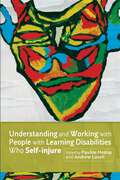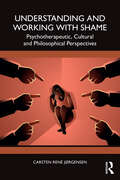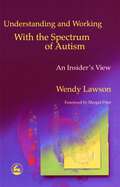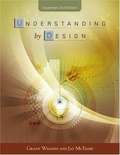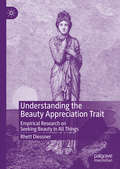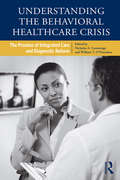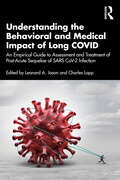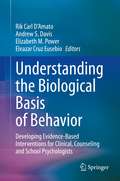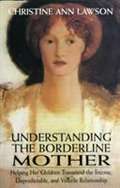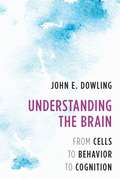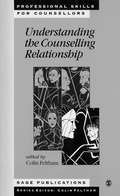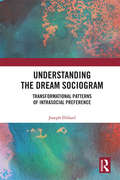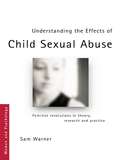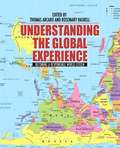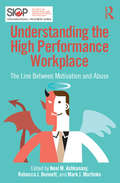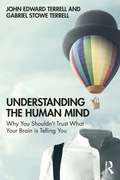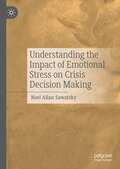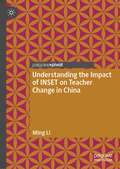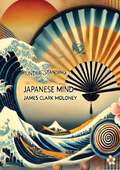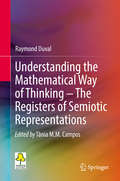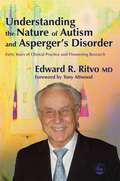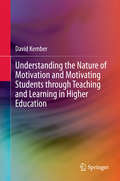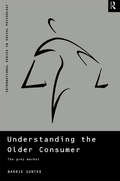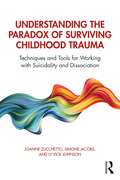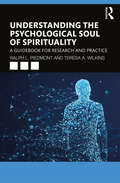- Table View
- List View
Understanding and Working with People with Learning Disabilities Who Self-injure
by Edited by Pauline Heslop Andrew LovellAdopting a predominantly psychological approach, this book provides carers with up-to-date information and resources to provide appropriately individualised care to people with learning disabilities who self-injure. Understanding and Working with People with Learning Disabilities who Self-Injure synthesises traditional (behavioural) and newer (psychological) approaches to understanding self-injury, drawing on psychoanalytic and social theory to provide practical guidelines for more sustained and effective support. It suggests that motivations for self-injury may be similar for people with and without learning disabilities, and draws on case work examples to suggest person-centred techniques that encourage communication - particularly important with people who do not use verbal communication - and recovery. The book covers a range of specific needs, including people with autism who self-injure, and emphasises the views of people with learning disabilities themselves and their families about what has worked best, and why. At the end of each chapter, a variety of practical implications for the provision of support are given. This book is for those supporting people with learning disabilities who self-injure and will be a useful resource for social workers, psychologists, counsellors, learning support workers, nurses and social and health care students.
Understanding and Working with Shame: Psychotherapeutic, Cultural and Philosophical Perspectives
by Carsten René JørgensenThis book discusses the pivotal role of shame in a wide range of mental disorders and as a driving force in societal polarization and escalating conflicts between nations and population groups.Exploring the phenomenology of one of the most vulnerable and painful of human emotions, shame, Jørgensen dives deep into its many facets and the ways in which it manifests in mental illnesses and everyday life. Delving into an in-depth discussion of the differentiation between the moral and ethical feelings of guilt and shame, he presses the need to distinguish between constructive and destructive feelings of shame. He examines how shame permeates societal and cultural expectations, on both individual and collective levels. Solution-centric in its approach, the author not only discusses the destructive feelings of shame particularly common among individuals with more severe mental disorders, but also offers specific advice to therapists on how to deal with it.The book will be an essential read for psychoanalysts, psychotherapists, philosophers, and anyone wanting to understand the power of shame in our lives.
Understanding and Working with the Spectrum of Autism: An Insider's View
by Wendy LawsonTo many of the people who live or work with an individual with an autism spectrum disorder (ASD), the processes by which those with autism make sense of the world around them may seem mysterious. In Understanding and Working with the Spectrum of Autism Wendy Lawson demonstrates these processes using comparisons from the non-ASD world to help professionals, families and carers to relate to and communicate with people with ASD better. Exercises at the back of the book encourage the reader to reflect on what has been discussed. The second part of the book contains chapters presenting a range of interventions and strategies for particular situations. Wendy illustrates her text with examples from her own life and from the lives of those she has met or worked with to clarify her points. She analyses ASD characteristics and examines interventions for dealing with social skills, anger management and self-esteem. Stress, its effects on the families of children with autism, and how best it can be alleviated, is also explored. Wendy writes in the light of her personal experience of an autism spectrum disorder as well as that of the available literature to create a book that is both readable and wide-ranging, furthering understanding of the links and differences between neurotypical individuals and those with ASD. Her book is an essential introduction to ASD for social workers, nurses, health professionals and those working in related fields.
Understanding by Design (Expanded 2nd edition)
by Jay Mctighe Grant P. WigginsDrawing on feedback from thousands of educators around the world who have used the UbD framework since its introduction in 1998, the authors have greatly revised and expanded their original work to guide educators across the K16 spectrum in the design of curriculum, assessment, and instruction.
Understanding the Beauty Appreciation Trait: Empirical Research on Seeking Beauty in All Things
by Rhett DiessnerThis book takes the reader on a grand tour of the empirical research concerning the personality trait of appreciation of beauty. It particularly focuses on engagement with natural beauty, engagement with artistic beauty, and engagement with moral beauty. The book addresses philosophers’ thoughts about beauty, especially the special emphasis on the intimate relationship between love and beauty; appreciation of beauty from an evolutionary standpoint; and the emerging science of neuroaesthetics. The book concludes with a consideration of beauty and pedagogy/andragogy, as well as methodologies to increase appreciation of beauty.
Understanding the Behavioral Healthcare Crisis: The Promise of Integrated Care and Diagnostic Reform
by Nicholas A. Cummings William T. O’DonohueUnderstanding the Behavioral Healthcare Crisis is a necessary book, edited and contributed to by a great variety of authors from academia, government, and industry. The book takes a bold look at what reforms are needed in healthcare and provides specific recommendations. Some of the serious concerns about the healthcare system that Cummings, O’Donohue, and their contributors address include access problems, safety problems, costs problems, the uninsured, and problems with efficacy. When students, practitioners, researchers, and policy makers finish reading this book they will have not just a greater idea of what problems still exist in healthcare, but, more importantly, a clearer idea of how to tackle them and provide much-needed reform.
Understanding the Behavioral and Medical Impact of Long COVID: An Empirical Guide to Assessment and Treatment of Post-Acute Sequelae of SARS CoV-2 Infection
by Leonard A. Jason and Charles LappUnderstanding the Behavioral and Medical Impact of Long COVID serves to expand the research around the illness in order to enable health care researchers and practitioners to address the questions that are imperative to individuals suffering from this condition. Through its multi-faceted approach, the book puts forth a maturation of research and interventions that are theoretically sound, empirically valid, innovative, and creative in the Long COVID area. As a scholarly and scientific compilation of Long COVID symptoms and related disorders, this book offers unparalleled insight into the critical developments across medical areas treating this illness. It helps to fill the space that the pandemic had created for knowledge of the condition, and contributes to the emerging emphasis on translational research blending the social sciences and biological fields. By putting forth the most optimal medical care practices in the treatment of complex Long COVID symptoms, this practical anthology will serve as a guide for practicing clinicians in assessment as well as treatment. It will also benefit researchers aiming to gain more understanding of Long COVID through its discussion around the critical developments in other medical areas treating the condition, and paves the way for the collaboration and future research needed to best support the global effort to mitigate the effects of this illness. This book will be essential reading for academics, practitioners, and researchers. It will appeal to individuals engaging with the fields of medicine, public policy, psychology, and for researchers looking to gain clarity about our current understanding of Long COVID. It will further be of interest to public/government agencies, nonprofit organizations, and the general public wanting to gain more information about these ambiguous and evasive symptoms.
Understanding the Biological Basis of Behavior: Developing Evidence-Based Interventions for Clinical, Counseling and School Psychologists
by Rik Carl D’Amato Andrew S. Davis Elizabeth M. Power Eleazar Cruz EusebioThis book is an introduction to the biological basis of behavior, broadly defined, with practical applications for higher education programs that focus on advances in neuroscience. It has a special focus on training practitioners based on American Psychological Association (APA) health service psychology guidelines. It reviews and digests information for clinical, counseling, and school psychologists serving clients of all ages in a variety of settings, such as schools, hospitals, and clinics. Content for all developmental stages, including birth to geriatric practices are highlighted. Some unique features of this book include:The integration of neuropsychological and theoretical foundations for clinical practice.Comprehensive consideration of projective, objective, and interviewing measures.Recent research in neuroimaging as it relates to clinical practice.Psychopharmacology and its effect within the neurosciences.Assessment for intervention in clinical, counseling, school, and neuropsychology.The use of research to guide neuropsychologically-based clinical practice.Eastern and western approaches to integration and case conceptualization.Interventions driven by brain-based scientific understanding.A variety of neuropsychological cases and report styles to improve practiceThe enduring contribution of psychology into modern times will remain contingent on practitioners' commitment to ethically-based, empirically-focused, evidence-based practice; continuing education; and scientific discovery. This book will help health service psychologists and counselors to meet the needs of an increasingly diverse population by providing cutting-edge, evidence-based, ecologically valid neuropsychological interventions currently lacking within the field. Cultural considerations are provided within each chapter, which is especially important given societal inequity that continues to persist within our world. Implications for the COVID-19 pandemic are also discussed in light of neuroscientific advances in medicine.
Understanding the Borderline Mother: Helping Her Children Transcend the Intense, Unpredictable, and Volatile Relationship
by Christine Ann LawsonSome readers may recognize their mothers as well as themselves in this book. They will also find specific suggestions for creating healthier relationships. Addressing the adult children of borderlines and the therapists who work with them, Dr. Lawson shows how to care for the waif without rescuing her, to attend to the hermit without feeding her fear, to love the queen without becoming her subject, and to live with the witch without becoming her victim.
Understanding the Brain: From Cells To Behavior To Cognition
by John E. DowlingAn examination of what makes us human and unique among all creatures—our brains. No reader curious about our “little grey cells” will want to pass up Harvard neuroscientist John E. Dowling’s brief introduction to the brain. In this up-to-date revision of his 1998 book Creating Mind, Dowling conveys the essence and vitality of the field of neuroscience—examining the progress we’ve made in understanding how brains work, and shedding light on discoveries having to do with aging, mental illness, and brain health. The first half of the book provides the nuts-and-bolts necessary for an up-to-date understanding of the brain. Covering the general organization of the brain, early chapters explain how cells communicate with one another to enable us to experience the world. The rest of the book touches on higher-level concepts such as vision, perception, language, memory, emotion, and consciousness. Beautifully illustrated and lucidly written, this introduction elegantly reveals the beauty of the organ that makes us uniquely human.
Understanding the Counselling Relationship (Professional Skills for Counsellors Series)
by Colin Feltham`This book presents contrasting views of the relationship between the counsellor, or therapist, and the client, as held by practitioners from diverse theoretical orientations. Each chapter clarifies and considers the elements of the counselling relationship which have the most bearing on therapeutic practice and the strengths of each are highlighted in terms of understanding, theory and skills' - New Therapist It is now widely accepted that the therapeutic relationship - referred to here as the counselling relationship - may be the most significant element in effective practice. Understanding the Counselling Relationship presents contrasting views of the relationship between the counsellor or therapist and the client, as held by practitioners from diverse theoretical orientations. Each chapter clarifies and considers the elements of the counselling relationship which have most bearing on therapeutic practice. The strengths of each position are highlighted in terms of understanding, theory and skills. The relevance of certain psychological, sociological and research-based issues for practitioners from a variety of theoretical backgrounds are also considered.
Understanding the Dream Sociogram: Transformational Patterns of Intrasocial Preference
by Joseph DillardUnderstanding the Dream Sociogram, the complementary volume to Dream Sociometry, explains how to take sociometric data from dreams and life issues and create a Dream Sociogram, to reveal patterns of intrasocial dynamics that clarify conflicts and reveal pathways to transformation. By identifying collectives of emerging potentials, or perspectives and relationships that are attempting to manifest higher order integration, this book teaches readers to stand back from personal and societal dramas and discover creative contexts that show an effective way forward. Unique in its approach to analysing dreams, the book introduces a methodology that teaches multi-perspectivalism as a way of resolving pressing life issues. It argues that humans, as naturally psychologically geocentric, need to evolve into a multi-perspectival world view and understanding of self. Exploring how to use the sociogram to deepen this understanding, the book offers practical examples and detailed real-life applications. Its integral and transpersonal applications of Moreno’s sociometry are novel and substantive in their addition to this field of research. The transpersonal results can be effective in reducing anxiety-based disorders, nightmares and phobias, as well as post-traumatic stress disorder and depression. As such, this book will be of interest to researchers in the fields of psychodrama, sociometry, group psychotherapy, transpersonal, experiential and action therapies, as well as postgraduate students studying psychology and sociology.
Understanding the Effects of Child Sexual Abuse: Feminist Revolutions in Theory, Research and Practice (Women and Psychology)
by Sam WarnerChild sexual abuse is a global problem that negatively affects many women and girls. As such, it has long been of concern to feminists, and more recently mental health activists. This book draws on this revolutionary legacy, feminism and post-structuralism to critically examine current perceptions of women, girls and child abuse in psychology, psychiatry and the mass media, and to re-evaluate mainstream and feminist approaches to this subject. The book aims to contribute to the ongoing development of a knowledge-base for working with abused women and girls, and demonstrates the need to question the use of formulaic methods in working with abused women and girls. It calls for an explicit concern with politics, principles and ethics in the related areas of theory, research and practice. Using research into women who have been sexually abused in childhood, and who are detained in maximum security mental health care, Sam Warner explores and identifies key principles for practice. A social recovery model of intervention is developed, and case study examples are used to demonstrate its applicability in a range of practice areas. These include abuse psychotherapy; expert witness reports in child protection; with mothers of abused girls; and with women and girls in secure care contexts. This thorough investigation of this emotive issue provides a clear theoretical and practical framework for understanding and coping with child sexual abuse. This book will be of interest to anyone who works with children and adults who have been abused. This includes clinical psychologists, therapists and other professionals that work in mental health, psychotherapy and social services; and legal settings within both community and secure care contexts. It should also be essential reading for students and academics in this area.
Understanding the Global Experience: Becoming a Responsible World Citizen
by Anthony Weston Thomas Arcaro Mathew Gendle Duane Mcclearn Laura Roselle Jean Schwind Kerstin Sorensen Rosemary Haskell Jeffrey C. Pugh Robert G. Anderson Ann J. Cahill Chinedu Ocek" Eke Lawrence A. Basirico Jeffrey Pugh Anne Bolin Stephen Braye Ann Cahill Brian Digre Ocek EkeThis cross-disciplinary anthology of contemporary global issues explores a number of topics and methodologies critical to developing responsible world citizenship. Globalism, Globalization, Culture, Environmentalism, Western Imperialism, Global Media and News; Global Media and News. For anyone wishing to better understand globalization and its impact.
Understanding the High Performance Workplace: The Line Between Motivation and Abuse (SIOP Organizational Frontiers Series)
by Neal M. Ashkanasy Rebecca J. Bennett Mark J. MartinkoThis book asks the crucial question: When does high performance supervision become abusive supervision? As more organizations push to adopt high performance work practices (HPWP), the onus increasingly falls on supervisors to do whatever it takes to maximize the productivity of their work teams. In this rigorous, research-based volume, international contributors offer insight into how and when seemingly-beneficial workplace practices cross the line from motivation to abuse. By reviewing critical issues in both high performance work practices and abusive supervision, it illuminates the crossover between these two modes of work, and forges a path for future scholarship.
Understanding the Human Mind: Why you shouldn’t trust what your brain is telling you
by John Edward Terrell Gabriel Stowe TerrellDrawing on current research in anthropology, cognitive psychology, neuroscience, and the humanities, Understanding the Human Mind explores how and why we, as humans, find it so easy to believe we are right—even when we are outright wrong. Humans live out their own lives effectively trapped in their own mind and, despite being exceptional survivors and a highly social species, our inner mental world is often misaligned with reality. In order to understand why, John Edward Terrell and Gabriel Stowe Terrell suggest current dual-process models of the mind overlook our mind’s most decisive and unpredictable mode: creativity. Using a three-dimensional model of the mind, the authors examine the human struggle to stay in touch with reality—how we succeed, how we fail, and how winning this struggle is key to our survival in an age of mounting social problems of our own making. Using news stories of logic-defying behavior, analogies to famous fictitious characters, and analysis of evolutionary and cognitive psychology theory, this fascinating account of how the mind works is a must-read for all interested in anthropology and cognitive psychology.
Understanding the Impact of Emotional Stress on Crisis Decision Making
by Noel Allan SawatzkyMotivational models are critical to understanding crisis decision making because leaders and their advisors are emotionally involved, intent on reducing stress, and motivated to find ways of advancing their interests while minimizing the risk of war. The principal theoretical work on the subject is Irving Janis and Leon Mann’s classic study of decision making, published in 1977. While useful, the book has a significant flaw: Janis and Mann theorize that policy maker stress during crisis is derived from decision deliberation, leading to a circular approach. This book solves the identified problem by addressing circularity between the rise of psychological stress, decision deliberation, and dysfunctional behavior with an independent measure of decision conditions using cognitive complexity. With an effective independent measure of stress, the key contribution of this volume is a reformulation of Janis and Mann’s model to render the construct more rigorous and empirically useful to the present-day study of crisis decision making.
Understanding the Impact of INSET on Teacher Change in China
by Ming LiThis pivot considers the impact of INSET courses on EFL teachers practicing under the national curriculum reform in China. Providing context-specific findings on the policy and implementation of INSET as well as its impact on teacher education initiatives in both China and similar contexts, it explores the limitations of one off training events such as INSET and the inconsistency between teacher learning results and their classroom practices. The book argues that teachers, when returning to pre-INSET teaching, are influenced by their prior deeply-rooted beliefs largely considered more powerful than newly-learnt theories. Addressing the rarely discussed fact that the complex and dynamic characteristics of teacher learning change over time and support the construct of teacher learning as a social event rather than a one-off event, the book also offers practical solutions on how to improve teacher education and enhance the long-term INSET impact on teacher development, with the ambition of promoting education reform for both teachers and students alike.
Understanding the Japanese Mind
by James Clark MoloneyExplore the intricate layers of Japanese culture and psychology with James Clark Moloney's insightful work, Understanding the Japanese Mind. This illuminating book delves deep into the unique characteristics and complexities that define Japanese thought and behavior, offering readers a comprehensive guide to understanding the cultural and psychological underpinnings of one of the world’s most fascinating societies.James Clark Moloney, an expert in East Asian studies, combines his extensive research with firsthand experiences to provide a nuanced analysis of the Japanese psyche. Understanding the Japanese Mind covers a wide array of topics, including social norms, communication styles, and the values that shape daily life in Japan. Moloney’s clear and engaging writing makes complex cultural concepts accessible to a broad audience.Key themes in the book include the importance of harmony and group cohesion, the concept of face (tatemae and honne), and the intricate social rituals that govern Japanese interactions. Moloney also explores the historical and philosophical roots of these cultural traits, drawing connections to Zen Buddhism, Confucianism, and Shintoism.This book is an essential resource for students, scholars, business professionals, and anyone interested in gaining a deeper understanding of Japanese culture. Moloney’s balanced approach and thorough analysis offer readers a valuable perspective on the factors that influence Japanese behavior and thought processes.Join James Clark Moloney on a journey into the heart of Japanese culture, and gain a deeper appreciation for the complexities and nuances of the Japanese mind. Understanding the Japanese Mind is a timeless exploration of cultural psychology that continues to resonate with readers seeking to bridge the gap between East and West.
Understanding the Mathematical Way of Thinking – The Registers of Semiotic Representations
by Raymond DuvalIn this book, Raymond Duval shows how his theory of registers of semiotic representation can be used as a tool to analyze the cognitive processes through which students develop mathematical thinking. To Duval, the analysis of mathematical knowledge is in its essence the analysis of the cognitive synergy between different kinds of semiotic representation registers, because the mathematical way of thinking and working is based on transformations of semiotic representations into others. Based on this assumption, he proposes the use of semiotics to identify and develop the specific cognitive processes required to the acquisition of mathematical knowledge. In this volume he presents a method to do so, addressing the following questions:• How to situate the registers of representation regarding the other semiotic “theories” • Why use a semio-cognitive analysis of the mathematical activity to teach mathematics • How to distinguish the different types of registers • How to organize learning tasks and activities which take into account the registers of representation • How to make an analysis of the students’ production in terms of registersBuilding upon the contributions he first presented in his classic book Sémiosis et pensée humaine, in this volume Duval focuses less on theoretical issues and more on how his theory can be used both as a tool for analysis and a working method to help mathematics teachers apply semiotics to their everyday work. He also dedicates a complete chapter to show how his theory can be applied as a new strategy to teach geometry.“Understanding the Mathematical Way of Thinking – The Registers of Semiotic Representations is an essential work for mathematics educators and mathematics teachers who look for an introduction to Raymond Duval’s cognitive theory of semiotic registers of representation, making it possible for them to see and teach mathematics with fresh eyes.”Professor Tânia M. M. Campos, PHD.
Understanding the Nature of Autism and Asperger's Disorder: Forty Years of Clinical Practice and Pioneering Research
by Anthony Attwood Edward R RitvoEdward R. Ritvo md is an internationally recognized medical expert, researcher and pioneer in the field of autism and Asperger's disorder and co-author of the official diagnostic criteria in the DSM (Diagnostic and Statistical Manual of Mental Disorders). Much of what is known about these disorders today is based on his painstaking research and groundbreaking discoveries. In this book he shares his forty years' experience and opens his extensive UCLA casebook to the reader. Understanding the Nature of Autism and Asperger's Disorder is 'a consultation with Prof. Ritvo' - a thoroughly accessible introduction for professionals, families, spouses and individuals with autism and Asperger's Disorder. Prof. Ritvo traces the historical development of understanding about autism and Asperger's Disorder, from the centuries of misdiagnoses and the first recognition of the characteristics of the disorders to his own highly-regarded methods for making a diagnosis. Drawing on case histories from forty years' of clinical practice, he explains their basic nature, what the causes are, what is different in the brain, treatments that work (and those that don't), what a child with a diagnosis might be like when he or she grows up, and what future research may hold. This book will be an absolute must-read for anyone with an interest in autism and Asperger's Disorder, whether a practitioner, a parent, a student, or an affected individual.
Understanding the Nature of Motivation and Motivating Students through Teaching and Learning in Higher Education
by David KemberThis book is based upon three interrelated open naturalistic studies conducted to better characterise the motivational orientation of students in higher education. Open semi-structured individual interviews were conducted with undergraduates, students at community colleges and students in taught postgraduate courses in Hong Kong. The analysis used an exploratory grounded theory approach and resulted in a motivational orientation framework with six continua with positive and negative poles. On enrolment students had positions on the six facets of motivation, which shifted as they progressed through their degree according to their perceptions of the teaching and learning environment. The framework can, therefore, be used to explain both initial decisions to enrol and motivation to continue studying. The interviews included descriptions of teaching approaches and learning activities and their effects on motivation. This made it possible to describe a teaching and learning environment conducive to motivation, with eight supportive conditions. Each facet of the teaching and learning environment is illustrated with quotations from the three groups of students, resulting in a guide to configuring a teaching and learning environment conducive to motivating students. The emerging community-college sector in Hong Kong is used as a case study of the effects on student motivation of the expansion of the higher education sector through private colleges. Cultural issues are discussed, particularly the performance of Asian students relative to those in the West.
Understanding the Older Consumer: The Grey Market (International Series in Social Psychology)
by Barrie GunterIn Understanding the Older Consumer, Barrie Gunter provides a detailed examination of the demographic, behavioural and psychological profiles of the older consumer. He shows that without the responsibilities of loans and child raising and with better financial provision than in previous years, the over-50s represent a powerful spending force. In order to reach this group, Barrie Gunter shows how to target advertising and respond to the changes that have occurred. Understanding the Older Consumer provides a wealth of information on older people's lifestyles and leisure, their interest in the mass media, their perceptions of advertising and their shopping.
Understanding the Paradox of Surviving Childhood Trauma: Techniques and Tools for Working with Suicidality and Dissociation
by Joanne Zucchetto Simone Jacobs Ly Vick JohnsonUnderstanding the Paradox of Surviving Childhood Trauma offers clinicians a new framework for understanding the symptoms and coping mechanisms displayed by survivors of childhood abuse. This approach considers how characteristics such as suicidality, self-harm, persistent depression, and anxiety can have roots in behaviors and beliefs that helped patients survive their trauma. This book provides practitioners with case examples, practical tips, and techniques for applying this mindset directly to their most complex cases. By depathologizing patients’ experiences and behaviors, and moving beyond simply managing them, therapists can reduce their clients’ shame and work collaboratively to understand the underlying message that these behaviors conceal.
Understanding the Psychological Soul of Spirituality: A Guidebook for Research and Practice
by Ralph L. Piedmont Teresa A. WilkinsUnderstanding the Psychological Soul of Spirituality is a comprehensive exploration of spiritual constructs based on an empirical, evidence-based paradigm for understanding and addressing spirituality. In a field where there is no current consensus on spirituality, this book provides a much-needed psychologically based definition and ontology that assists helping professionals in formulating their professional identities; developing effective and appropriate training models; furthering their understanding of what spirituality is and is not, from a psychological perspective; and more effectively addressing spiritual issues to support clients. The authors provide a review of current issues in the area of spirituality, also called the numinous, and provide perspectives that address these concerns in ways that promote a fully scientific understanding of the construct. Ultimately the book provides a concise definition of the numinous that places it squarely in the social sciences. Chapters outline the clear value of the numinous for psychology and detail its relevance for professionals’ training.
